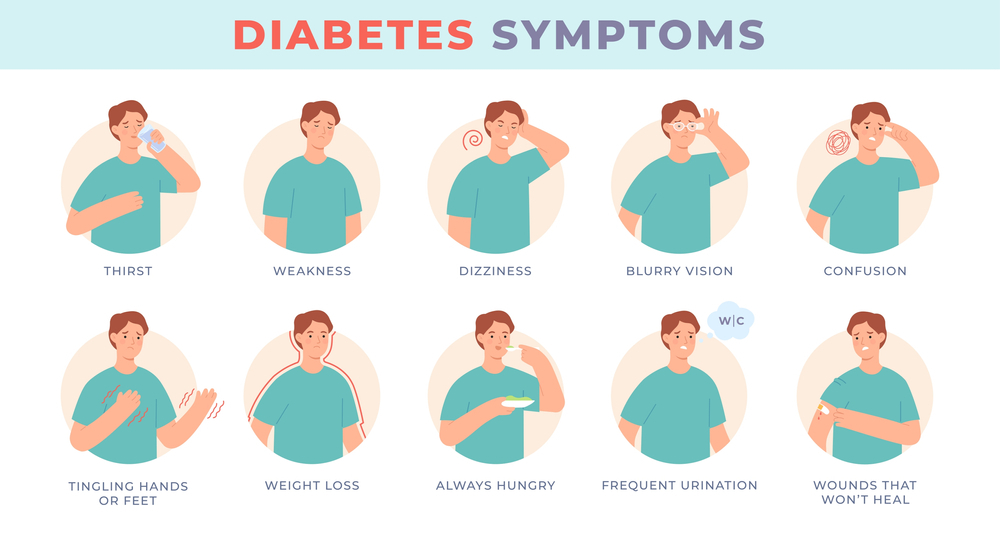What Your Body is Saying About Your Health: Understanding Symptoms and Complications of Diabetes
Diabetes is a chronic disease that affects several people throughout the world. It happens when the body cannot produce enough insulin or use it effectively, resulting in high blood sugar levels. Diabetes, if left untreated, can have serious consequences such as nerve damage, vision loss, and kidney disease. This blog will take a deep dive into the symptoms of diabetes to watch out for, as well as its types and complications.
Understanding Diabetes and Its Types
Diabetes is classified into three types: type 1, type 2, and gestational diabetes. Type 1 is an autoimmune condition in which the body's immune system destroys insulin-producing pancreatic cells. This kind of diabetes most commonly affects children and adolescents and is treated with insulin injections.
Type 2 diabetes, on the contrary, occurs when the body cannot properly employ insulin or produces insufficient insulin. It is the most frequent kind of diabetes among adults. Type 2 diabetes can be managed with lifestyle changes such as eating a nutritious diet, decreasing weight, and exercising regularly, or by taking medication such as insulin injections or oral medicines.
Gestational diabetes develops when the body cannot produce enough insulin during pregnancy. This kind of diabetes usually resolves after delivery, but women with gestational diabetes are more likely to develop type 2 diabetes later in life.
Common Symptoms of Diabetes
- Increased thirst and hunger
- Frequent urination
- Fatigue
- Blurred vision
- Slow-healing wounds
- Hand or feet numbness or tingling
- Unexplained weight loss
- Irritability or mood changes
- Extreme thirst
- Frequent urination
- Bedwetting in children who previously didn't wet the bed
- Increased hunger
- Unexplained weight loss
- Fatigue
- Irritability or mood changes
- Blurred vision
if left untreated, type 1 diabetes can lead to diabetic ketoacidosis (DKA), a life-threatening condition that requires immediate medical attention.
Type 2 diabetes can develop slowly over time, and some symptoms may not be noticeable at first.
- Increased Thirst and Hunger
- Frequent Urination
- Fatigue
- Blurred Vision
- Numbness or Tingling in the hands or Feet
People who are overweight, have a family history of diabetes or have high blood pressure or high cholesterol are at a higher risk of developing type 2 diabetes.
Diabetic Emergencies: What to Watch for and When to Seek Help
- Dizziness or lightheadedness
- Confusion
- Rapid heartbeat
- Sweating
- Shaking
- Seizures
- Unconsciousness

Complications of diabetes: Long-term effects and how to prevent them
Preventing these complications requires good diabetes management. This includes regularly monitoring blood sugar levels, taking medications as prescribed by a doctor, maintaining a healthy diet, and doing regular exercise. It is also important to maintain a healthy weight and avoid smoking.
People with diabetes may also benefit from working with healthcare consultants such as diabetologists, diabetes educators, and dietitians to help manage their condition. For example, a diabetologist in Noida can help provide specialized care and guidance for people with diabetes in the area. Additionally, a diabetes dietitian in Noida can help develop meal plans and provide nutritional counseling to help manage blood sugar levels.
Diabetes is a severe condition that can lead to various health complications. Understanding the symptoms of diabetes, including early warning signs of type 1 diabetes and recognizing the symptoms of type 2 diabetes, can help people get an early diagnosis and start treatment. It is also important to watch for diabetic emergencies and seek medical help immediately if any symptoms are present.
In addition to seeking medical help, it is also imperative to manage diabetes through lifestyle changes, including maintaining a healthy diet and regular physical activity. Consulting a diabetes dietitian in Noida can be particularly helpful in developing a personalized meal plan that considers the individual's unique needs and preferences.
Regular check-ups can also help in managing diabetes and preventing long-term complications. With proper management, individuals with diabetes can live healthy and fulfilling lives.
















